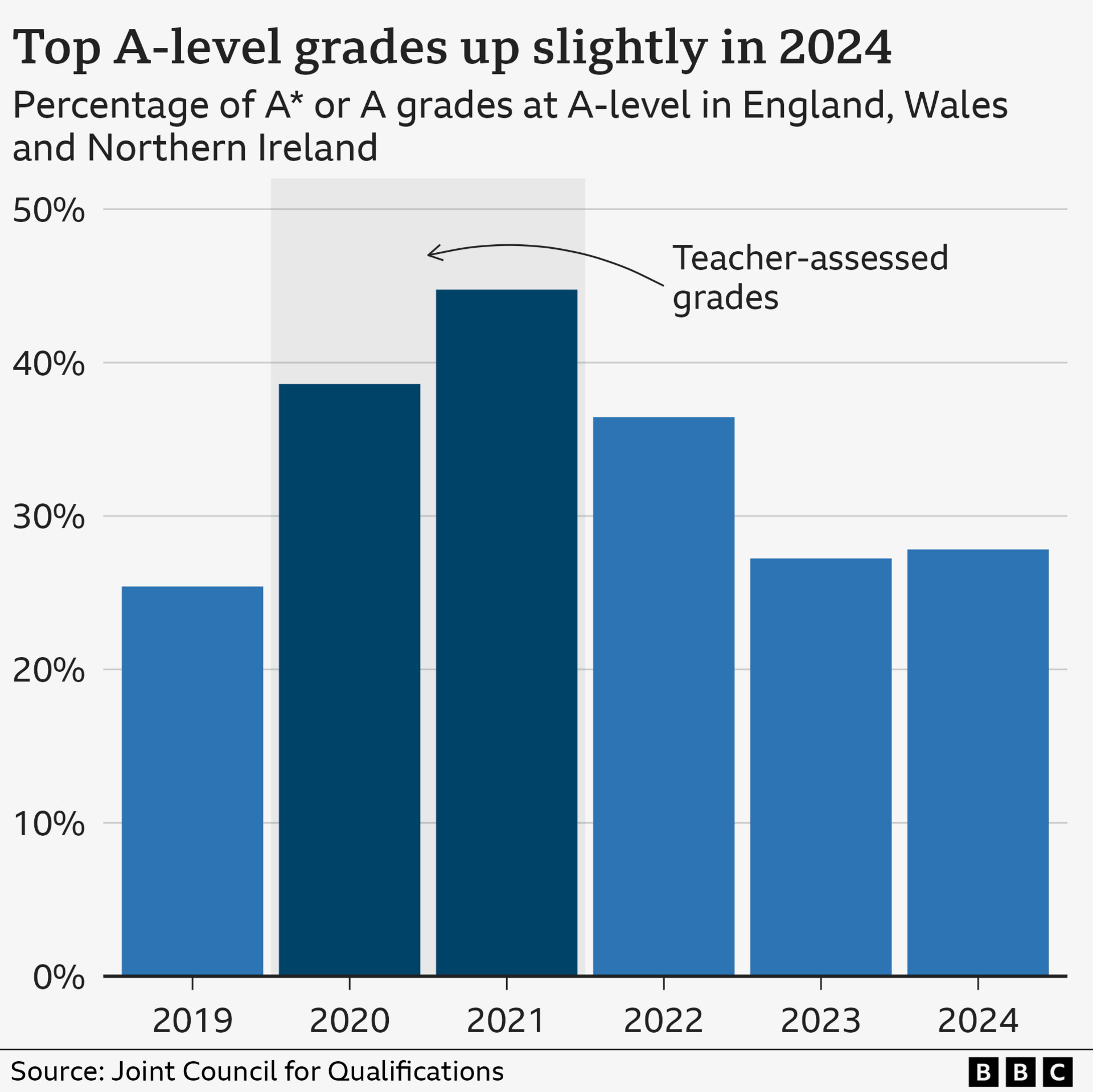Top A-level grades rise across England, Wales and NI

Students receiving their results at Ark Globe Academy, London
- Published
The percentage of top A-level grades has risen for the first time since 2021 across England, Wales and Northern Ireland.
Overall this year 27.8% of all grades were A* or A - up from 27.2% in 2023, although it is a different story in each individual nation.
Students in the three nations received results for A-levels, T-levels and BTec on Thursday morning.
Of students applying to university, 82% achieved the grades they needed for their first choice course.

Students in Scotland received their exam results earlier in August when the pass rate for Higher exams returned to its 2019 level, and the pass rate for National 5s and Advanced Highers dropped further.
The Universities and Colleges Admissions Service (Ucas) said anyone who did not get the results they needed to meet university offers would find spaces in clearing,, external its online system advertising courses with vacancies.
This year, grades were expected to drop to 2019 levels in all three nations after a spike in top grades in 2020 and 2021, when exams were cancelled because of Covid.
Since then, there has been a phased effort to bring them back down in line with pre-pandemic levels.
This began in earnest in England last year - but in Wales and Northern Ireland changes to grade boundaries happened this year.
The actual results vary, rising slightly in England but falling in Wales and Northern Ireland.
This year the proportion of A-levels marked at A* or A was:
27.6% in England, up from 26.5% in 2023
29.9% in Wales, down from 34%
30.3% in Northern Ireland, down from 37.5%
Overall the proportion of top grades is just over two percentage points higher than it was in 2019.

'My coma inspired me to study medicine'
By Larissa Tairo, reporting from Burnley College

In September, Eshan, from Burnley, will be going to University of St Andrews in Fife to study medicine, having achieved the grades he needs for the course.
In 2022 he was in a coma with sepsis for three weeks and says the experience inspired him to be a doctor.
“I saw how doctors, nurses and everybody works together in the aims of caring for a patient, and I want to be a part of that team,” he says.
Eshan will be the first person in his family to go to university. He is a little nervous about studying in an area with little ethnic diversity - but very excited about the course.
"I know how it feels to be on that bed, to not walk freely or move how you want to," he said.
"I can apply that in future... and have an empathetic approach."

This is also the third year of results for vocational T-level qualifications in England.
To achieve the technical qualification, time is split between classroom learning and industry placements - with students awarded a pass, merit, distinction or distinction* after two years of work and study.
About 200,000 students also received their results for BTec Nationals and Cambridge Technicals.
In England, the north-south divide in exam success remains entrenched.
This year's results show the gap between the regions with the highest and lowest proportions of top grades has grown and is still higher than it was before the pandemic.
London was the highest performing region, with 31.3% of all grades marked A* or A
The East Midlands was the lowest performing, with 22.5% of grades marked A* or A
However, grades in some areas in the Midlands and the North have improved at a higher rate than those in the South.
In fact the North East and the West Midlands saw the biggest growth in top grades.
How can I help my kids through exam results day?
- Published22 August 2024
'I got no GCSEs and cleaned pubs - now I'm a uni lecturer'
- Published22 August 2024
Prime Minister Sir Keir Starmer offered his congratulations to students who opened their exam results on Thursday.
"Nothing should hold you back from achieving your ambition," he said.
Earlier, Education Secretary Bridget Phillipson said she was concerned about the widening gap in attainment between students from different backgrounds.
The government is "absolutely determined to make a difference there", said Ms Phillipson.
Ucas says there will be just under 30,000 courses available through clearing.
"For anyone who doesn't receive the results they were expecting or those who want to reconsider their choice, there will be plenty of options," said a spokesperson.
"As is the case each year, clearing is likely to be competitive for the most selective courses and at the most selective universities."
Students were advised to look at clearing ahead of results day, in case they did not get the results they needed for their firm or insurance choices.
Thursday's results come after the government launched a review, external of the national curriculum in England.
A report by the National Foundation for Educational Research, commissioned by the British Academy, suggests the range of subjects young people are studying after the age of 16 has narrowed, with a particular decline in arts and humanities subjects.



